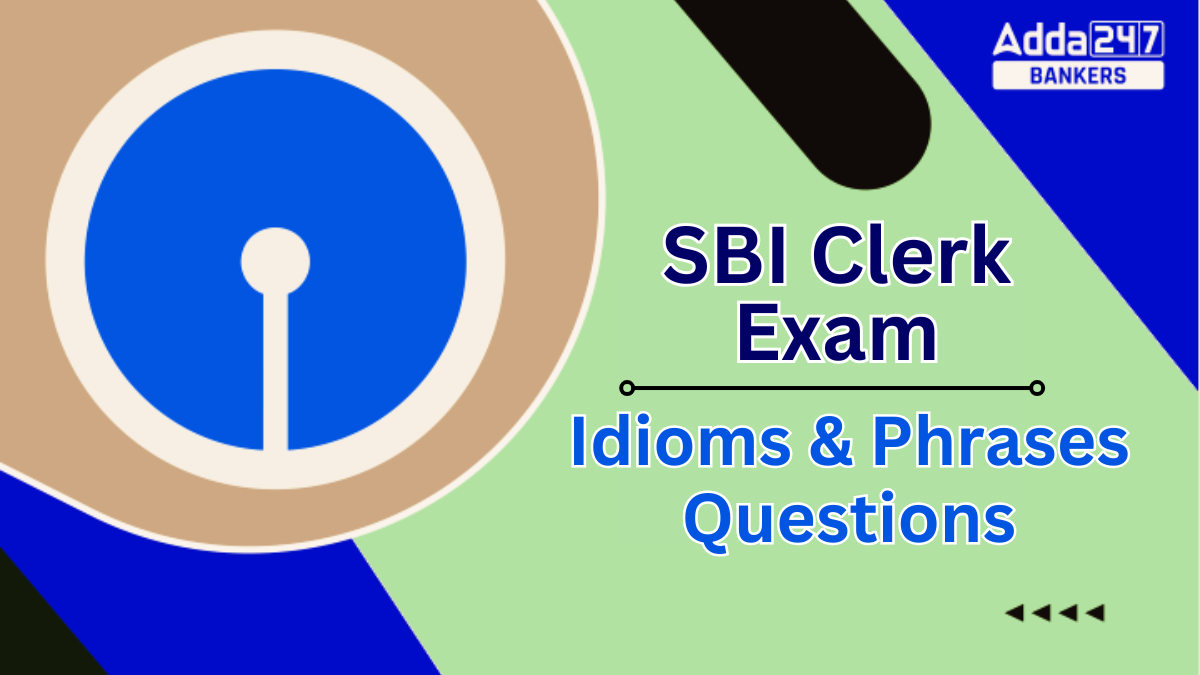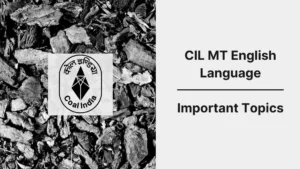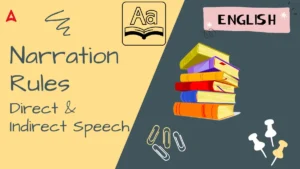Table of Contents
The English section is a crucial part of the SBI Clerk 2025 Exam, requiring a strong grasp of language skills for effective problem-solving. Among the various topics, Idioms and Phrases play a vital role in testing your ability to understand and interpret figurative expressions. Mastery of this topic enhances comprehension and vocabulary, which is essential for both the Prelims and Mains stages. To support your preparation, we have compiled a set of Idioms and Phrases questions for SBI Clerk Exam.
Idioms and Phrases Questions for SBI Clerk Exam
In the SBI Clerk 2025 exam, past trends show that the Idioms and Phrases section in the English paper generally consists of a few questions. Each question is accompanied by a detailed explanation to help you understand the meaning and correct usage of various idiomatic expressions. Below, we have arranged a series of practice questions in a structured manner to strengthen your understanding and improve your performance in this section.
Also Read, SBI Clerk Prelims Result 2025
Q1. Choose the most appropriate meaning of the given idiom.
“Burn the midnight oil.”
(a) To stay up late working or studying.
(b) To waste fuel unnecessarily.
(c) To cause a fire accident.
(d) To give up on sleep entirely.
(e) To quit working altogether.
Q2. Choose the most appropriate meaning of the given idiom.
“Throw in the towel.”
(a) To collaborate with others
(b) To offer help.
(c) To cause an argument.
(d) To clean up a mess.
(e) To quit or give up.
Q3. Choose the most appropriate meaning of the given idiom.
“Hit the nail on the head.”
(a) To fix something perfectly.
(b) To say exactly the right thing.
(c) To cause a problem unintentionally.
(d) To criticize someone harshly.
(e) To take unnecessary risks.
Q4. Choose the most appropriate meaning of the given idiom.
“Spill the beans.”
(a) To spill something accidentally.
(b) To apologize for a mistake.
(c) To waste food carelessly.
(d) To reveal a secret.
(e) To prepare food in a hurry.
Q5. Choose the most appropriate meaning of the given idiom.
“Pull someone’s leg.”
(a) To physically drag someone.
(b) To play a joke on someone.
(c) To force someone to walk faster.
(d) To help someone in need.
(e) To criticize someone harshly.
SBI Clerk Prelims Exam Analysis 2025, 22nd February 2025 Shift 1
Q6. Choose the most appropriate meaning of the given idiom.
“Beat around the bush.”
(a) To avoid the main topic.
(b) To hunt for animals in a bush.
(c) To create unnecessary problems.
(d) To attack someone indirectly.
(e) To resolve a conflict peacefully.
Q7. Choose the most appropriate meaning of the given idiom.
“Let the cat out of the bag.”
(a) To spoil a surprise intentionally.
(b) To start an argument.
(c) To release a pet from its cage.
(d) To confess to a crime.
(e) To accidentally reveal a secret.
Q8. Choose the most appropriate meaning of the given idiom.
“Cold feet.”
(a) To feel physically cold.
(b) To make a sudden decision.
(c) To feel nervous or afraid about something.
(d) To cancel a plan at the last moment.
(e) To take a bold risk.
Q9. Choose the most appropriate meaning of the given idiom.
“The ball is in your court.”
(a) There is no solution to the problem.
(b) Someone else is in charge of the situation.
(c) You have lost control over the situation.
(d) The situation is unpredictable.
(e) You are responsible for making the next move.
Q10. Choose the most appropriate meaning of the given idiom.
“Hit the ground running.”
(a) To start something and fail immediately.
(b) To start a task with enthusiasm and energy.
(c) To run away from a problem.
(d) To prepare for a long break.
(e) To begin something reluctantly.
Q11. In each of the question given below a/an idiom/phrase is given in bold which is then followed by five options which then try to decipher its meaning. Choose the option which gives the correct meaning of the phrases.
Looking to your laurels
(a) To immediately start training
(b) To plan a victory celebration
(c) To scout for new talent immediately
(d) To disregard the achievements
(e) To rest on past achievements
Q12. In each of the question given below a/an idiom/phrase is given in bold which is then followed by five options which then try to decipher its meaning. Choose the option which gives the correct meaning of the phrases.
Bear a grudge
(a) To forget past conflicts
(b) To hold onto resentment or ill feelings
(c) To make amends with ease
(d) To celebrate their shared history
(e) To lose contact without reason
Q13. In each of the question given below a/an idiom/phrase is given in bold which is then followed by five options which then try to decipher its meaning. Choose the option which gives the correct meaning of the phrases.
By the skin of your teeth
(a) With high marks and accolades
(b) Without any preparation
(c) After multiple attempts
(d) By a very narrow margin
(e) By collaborating with peers
Q14. In each of the question given below a/an idiom/phrase is given in bold which is then followed by five options which then try to decipher its meaning. Choose the option which gives the correct meaning of the phrases.
Down for the count
(a) Energized and more productive than ever
(b) Temporarily incapacitated or defeated
(c) Ready to take on new challenges
(d) Waiting for their turn to present ideas
(e) Taking a short break for relaxation
Q15. In each of the question given below a/an idiom/phrase is given in bold which is then followed by five options which then try to decipher its meaning. Choose the option which gives the correct meaning of the phrases.
Draw the line
(a) To request more responsibilities
(b) To extend working hours voluntarily
(c) To set a clear boundary or limit
(d) To erase previous agreements
(e) To initiate negotiations for a raise
Q16. The sentences given below consist of an idiom/phrasal verb given in bold. From the given alternatives, identify the most suitable option reflecting the meaning of the idiom/phrasal verb.
Despite multiple warnings, he continued to spend extravagantly. Now, he is finally paying the piper for his actions.
(a) Facing rewards for reckless decisions
(b) Facing the consequences of his actions
(c) Celebrating his success
(d) Ignoring the consequences of his actions
(e) Asking someone else to take responsibility
Q17. The sentences given below consist of an idiom/phrasal verb given in bold. From the given alternatives, identify the most suitable option reflecting the meaning of the idiom/phrasal verb.
I know you’ve been struggling with the new project, but don’t worry—it’s just a blessing in disguise.
(a) A minor inconvenience
(b) An avoidable problem
(c) A terrible mistake
(d) A sign of bad luck
(e) An unexpected benefit
Q18. The sentences given below consist of an idiom/phrasal verb given in bold. From the given alternatives, identify the most suitable option reflecting the meaning of the idiom/phrasal verb.
The coach emphasized that there were no shortcuts to success and that every player had to go the extra mile to secure a victory.
(a) Give up on their goals
(b) Avoid unnecessary risks
(c) Put in extra effort
(d) Take a break to recharge
(e) Follow the shortest path to success
Q19. The sentences given below consist of an idiom/phrasal verb given in bold. From the given alternatives, identify the most suitable option reflecting the meaning of the idiom/phrasal verb.
The CEO announced that the company would cut corners to reduce costs, even if it meant compromising on quality.
(a) Avoid unnecessary expenses
(b) Increase production speed
(c) Take shortcuts, often at the expense of quality
(d) Make thoughtful and careful decisions
(e) Focus on reducing waste
Q20. The sentences given below consist of an idiom/phrasal verb given in bold. From the given alternatives, identify the most suitable option reflecting the meaning of the idiom/phrasal verb.
The politician refused to discuss his personal life, stating that it was none of their business to pry into his affairs.
(a) Irrelevant to the matter
(b) Not their concern
(c) Too controversial
(d) A sign of dishonesty
(e) Open for debate
Solutions
S1. Ans.(a)
Sol. The idiom “burn the midnight oil” means to work late into the night, often studying or completing a task. It refers to the time when people used oil lamps for light while working late.
Meaning in Hindi: रात देर तक पढ़ाई या काम करना।
Explanation of Incorrect Options:
(b) To waste fuel unnecessarily – This is incorrect as the idiom is not related to wasting oil or fuel.
(c) To cause a fire accident – This is incorrect because the idiom has nothing to do with fire or accidents.
(d) To give up on sleep entirely – This is incorrect as the idiom refers to staying up late, not permanently avoiding sleep.
(e) To quit working altogether – This is incorrect because the idiom emphasizes working late, not quitting.
Correct Answer:
(a) To stay up late working or studying
S2. Ans.(e)
Sol. The idiom “throw in the towel” means to admit defeat or give up in a difficult situation, often after trying hard but realizing that continuing is futile.
Meaning in Hindi: हार मान लेना।
In the given options, the correct meaning is clearly about quitting or surrendering, which aligns with option (e).
Explanation of Incorrect Options:
(a) To collaborate with others – This is incorrect because the idiom does not mean working together or collaborating.
(b) To offer help – This is incorrect because the idiom is not about helping someone; it refers to giving up.
(c) To cause an argument – This is incorrect because the idiom has nothing to do with starting an argument or conflict.
(d) To clean up a mess – This is incorrect because the idiom does not refer to cleaning or tidying.
Correct Answer:
(e) To quit or give up
S3. Ans.(b)
Sol. The idiom “hit the nail on the head” means to say or do something that is exactly right or perfectly accurate.
Meaning in Hindi: बिल्कुल सही बात कहना या करना।
Explanation of Incorrect Options:
(a) To fix something perfectly – This is incorrect because the idiom does not specifically refer to fixing something.
(c) To cause a problem unintentionally – This is incorrect as the idiom implies accuracy, not causing problems.
(d) To criticize someone harshly – This is incorrect because the idiom does not involve criticism.
(e) To take unnecessary risks – This is incorrect because the idiom is about accuracy, not risk-taking.
Correct Answer:
(b) To say exactly the right thing
S4. Ans.(d)
Sol. The idiom “spill the beans” means to reveal secret information, often unintentionally.
Meaning in Hindi: राज़ खोल देना।
Explanation of Incorrect Options:
(a) To spill something accidentally – This is incorrect because the idiom is metaphorical and refers to revealing secrets, not spilling things physically.
(b) To apologize for a mistake – This is incorrect as the idiom is not about apologizing.
(c) To waste food carelessly – This is incorrect because the idiom has nothing to do with food.
(e) To prepare food in a hurry – This is incorrect as the idiom does not refer to cooking.
Correct Answer:
(d) To reveal a secret
S5. Ans.(b)
Sol. The idiom “pull someone’s leg” means to tease or joke with someone in a playful manner.
Meaning in Hindi: मजाक करना या चिढ़ाना।
Explanation of Incorrect Options:
(a) To physically drag someone – This is incorrect because the idiom does not involve physical actions.
(c) To force someone to walk faster – This is incorrect as the idiom is unrelated to walking or forcing movement.
(d) To help someone in need – This is incorrect because the idiom refers to teasing, not helping.
(e) To criticize someone harshly – This is incorrect as the idiom is about playful teasing, not criticism.
Correct Answer:
(b) To play a joke on someone
S6. Ans.(a)
Sol. The idiom “beat around the bush” means to avoid discussing the main topic or to speak indirectly instead of getting to the point.
Meaning in Hindi: मुद्दे को टालना या सीधे मुद्दे पर न आना।
Explanation of Incorrect Options:
(b) To hunt for animals in a bush – This is incorrect as the idiom is figurative and has nothing to do with hunting.
(c) To create unnecessary problems – This is incorrect because the idiom is about avoiding the main point, not creating problems.
(d) To attack someone indirectly – This is incorrect because the idiom does not imply attacking anyone, even indirectly.
(e) To resolve a conflict peacefully – This is incorrect as the idiom has no connection to resolving conflicts.
Correct Answer:
(a) To avoid the main topic
S7. Ans.(e)
Sol. The idiom “let the cat out of the bag” means to accidentally reveal a secret or disclose something that was supposed to remain hidden.
Meaning in Hindi: राज़ खोल देना।
Explanation of Incorrect Options:
(a) To spoil a surprise intentionally – This is incorrect as the idiom does not imply intentionality but rather accidental disclosure.
(b) To start an argument – This is incorrect as the idiom is about revealing secrets, not starting arguments.
(c) To release a pet from its cage – This is incorrect because the idiom is figurative and not about actual cats or cages.
(d) To confess to a crime – This is incorrect as the idiom is not about confessing but revealing a secret.
Correct Answer:
(e) To accidentally reveal a secret
S8. Ans.(c)
Sol. The idiom “cold feet” means to feel nervous, scared, or hesitant about doing something, especially before a big event or decision.
Meaning in Hindi: डर या झिझक महसूस करना।
Explanation of Incorrect Options:
(a) To feel physically cold – This is incorrect because the idiom is metaphorical and does not refer to physical temperature.
(b) To make a sudden decision – This is incorrect because the idiom refers to hesitation, not decisiveness.
(d) To cancel a plan at the last moment – This is incorrect because while the idiom may result in cancellations, it specifically refers to the feeling of fear or nervousness.
(e) To take a bold risk – This is the opposite of the idiom’s meaning, as “cold feet” implies hesitation, not boldness.
Correct Answer:
(c) To feel nervous or afraid about something
S9. Ans.(e)
Sol. The idiom “the ball is in your court” means that it is your turn to take action or make a decision in a situation.
Meaning in Hindi: अब निर्णय लेने की ज़िम्मेदारी आपकी है।
Explanation of Incorrect Options:
(a) There is no solution to the problem – This is incorrect as the idiom does not imply a lack of solutions.
(b) Someone else is in charge of the situation – This is incorrect because the idiom specifically implies that the responsibility lies with you.
(c) You have lost control over the situation – This is incorrect as the idiom means you have control and must act.
(d) The situation is unpredictable – This is incorrect because the idiom does not refer to unpredictability.
Correct Answer:
(e) You are responsible for making the next move
S10. Ans.(b)
Sol. The idiom “hit the ground running” means to begin a task or activity with energy, enthusiasm, and effectiveness, often without any delay.
Meaning in Hindi: ऊर्जा और जोश के साथ काम शुरू करना।
Explanation of Incorrect Options:
(a) To start something and fail immediately – This is incorrect because the idiom refers to beginning with success and energy, not failure.
(c) To run away from a problem – This is incorrect as the idiom does not imply avoidance or escape.
(d) To prepare for a long break – This is incorrect because the idiom is about starting something actively, not preparing for a pause.
(e) To begin something reluctantly – This is incorrect because the idiom involves enthusiasm, not reluctance.
Correct Answer:
(b) To start a task with enthusiasm and energy
S11. Ans.(e)
Sol. “Looking to your laurels” means to become complacent or overly satisfied with what one has already achieved, at the risk of not striving for future success. It’s a caution against resting on one’s past achievements and losing momentum or failing to continue working hard. Thus, the correct interpretation is option (e) To rest on past achievements.
S12. Ans.(b)
Sol. “Bear a grudge” means to continue feeling bitterness or resentment towards someone because of past wrongs or conflicts. It’s not about moving past disagreements, reconciling, commemorating shared experiences, or drifting apart without cause, but about maintaining negative feelings over time. Thus, the correct interpretation is option (b) To hold onto resentment or ill feelings.
S13. Ans.(d)
Sol. “By the skin of your teeth” means to barely succeed in doing something, often by a very narrow margin or with minimal difference between success and failure. It’s not about excelling, repeated efforts, lack of effort, or teamwork, but achieving something with very little to spare. Thus, the correct interpretation is option (d) By a very narrow margin.
S14. Ans.(b)
Sol. “Down for the count” means to be temporarily unable to participate, often because of illness, exhaustion, or facing a setback. It’s not about being energized, gearing up for new projects, queueing for presentations, or leisurely pausing, but being out of action. Thus, the correct interpretation is option (b) Temporarily incapacitated or defeated.
S15. Ans.(c)
Sol. “Draw the line” means to establish a clear boundary or limit on what is acceptable or tolerable, often to protect one’s interests, principles, or well-being. It’s not about seeking additional tasks, offering more time, undoing decisions, or discussing compensation, but about asserting limits. Thus, the correct interpretation is option (c) To set a clear boundary or limit.
S16. Ans.(b)
Sol. The idiom “paying the piper” means to face the consequences of one’s actions, particularly after indulging in irresponsible or reckless behavior.
Meaning in Hindi: अपने किए की सजा भुगतना।
In the given sentence, the context suggests that the person, despite multiple warnings, continued to spend extravagantly. Now, he is finally dealing with the repercussions of his actions, which aligns perfectly with the idiom’s meaning.
Explanation of Incorrect Options:
(a) Facing rewards for reckless decisions – This is completely incorrect because “paying the piper” refers to suffering consequences, not receiving rewards.
(c) Celebrating his success – This is incorrect because the idiom implies a negative outcome (facing repercussions), not a celebratory or positive situation.
(d) Ignoring the consequences of his actions – This is incorrect as the idiom means to face consequences, not ignore them.
(e) Asking someone else to take responsibility – This is incorrect because “paying the piper” involves personal accountability, not shifting responsibility to others.
Correct Answer:
(b) Facing the consequences of his actions
S17. Ans.(e)
Sol. The idiom “a blessing in disguise” means something that initially seems bad or unfortunate but ultimately turns out to have a positive outcome or benefit.
Meaning in Hindi: छुपा हुआ वरदान या प्रारंभ में बुरा लगने वाला लेकिन अंत में अच्छा साबित होने वाला।
In the given sentence, the speaker is trying to reassure someone struggling with a project, suggesting that the situation may eventually bring unexpected benefits.
Explanation of Incorrect Options:
(a) A minor inconvenience – This is incorrect because the idiom implies a hidden benefit, not a small inconvenience.
(b) An avoidable problem – This is incorrect because the idiom refers to something positive that arises unexpectedly, not a problem that could have been avoided.
(c) A terrible mistake – This is incorrect because the idiom does not mean a mistake but rather a hidden positive outcome.
(d) A sign of bad luck – This is incorrect as the idiom refers to something positive, not bad luck.
Correct Option:
(e) An unexpected benefit
S18. Ans.(c)
Sol. The idiom “go the extra mile” means to put in extra effort or go above and beyond what is expected to achieve a goal.
Meaning in Hindi: अधिक प्रयास करना या अपेक्षा से अधिक मेहनत करना।
In the given sentence, the coach is encouraging players to work harder and exceed expectations to achieve victory, which aligns perfectly with the meaning of the idiom.
Explanation of Incorrect Options:
(a) Give up on their goals – This is completely opposite to the idiom’s meaning, as “go the extra mile” refers to persistence and putting in additional effort, not giving up.
(b) Avoid unnecessary risks – This is incorrect because the idiom emphasizes extra effort, not avoiding risks.
(d) Take a break to recharge – This is incorrect as the idiom implies working harder, not taking a break.
(e) Follow the shortest path to success – This is incorrect as “go the extra mile” suggests putting in additional effort, not taking shortcuts.
Correct Answer:
(c) Put in extra effort
S19. Ans.(c)
Sol. The idiom “cut corners” means to do something in a cheaper, easier, or faster way by ignoring rules or sacrificing quality.
Meaning in Hindi: काम को सस्ता, तेज़, या आसान बनाने के लिए गुणवत्ता से समझौता करना।
In the given sentence, the CEO’s decision to reduce costs, even if it compromises quality, aligns perfectly with the meaning of the idiom “cut corners.”
Explanation of Incorrect Options:
(a) Avoid unnecessary expenses – This is incorrect because “cut corners” specifically refers to taking shortcuts by ignoring standards, not simply avoiding expenses.
(b) Increase production speed – This is incorrect because the idiom emphasizes reducing effort or quality, not necessarily increasing speed.
(d) Make thoughtful and careful decisions – This is the opposite of the idiom’s meaning, as “cut corners” refers to careless or rushed decisions that compromise quality.
(e) Focus on reducing waste – This is incorrect as the idiom does not refer to efficiency or waste reduction, but to compromising on quality to save time or money.
Correct Answer:
(c) Take shortcuts, often at the expense of quality
S20. Ans.(b)
Sol. The phrase “none of their business” means that something does not concern or involve someone and they have no right to interfere or inquire about it.
Meaning in Hindi: उनका कोई लेना-देना नहीं या किसी मामले में हस्तक्षेप करने का अधिकार नहीं।
In the given sentence, the politician is clearly asserting that others should not interfere or ask about his personal life, which directly corresponds to the meaning of the phrase.
Explanation of Incorrect Options:
(a) Irrelevant to the matter – This is incorrect because “none of their business” does not simply mean irrelevant; it emphasizes that someone has no right to interfere.
(c) Too controversial – This is incorrect because the idiom does not imply anything about controversy but about personal boundaries and lack of concern for others.
(d) A sign of dishonesty – This is incorrect because the idiom does not imply dishonesty, but rather refusal to share personal matters.
(e) Open for debate – This is incorrect because the idiom implies closing a topic to discussion, not making it open for debate.
Correct Answer:
(b) Not their concern




 Important Topics for CIL MT English Lang...
Important Topics for CIL MT English Lang...
 Narration Rules for Direct & Indirec...
Narration Rules for Direct & Indirec...
 How to Score 25+ Marks in the English Se...
How to Score 25+ Marks in the English Se...





